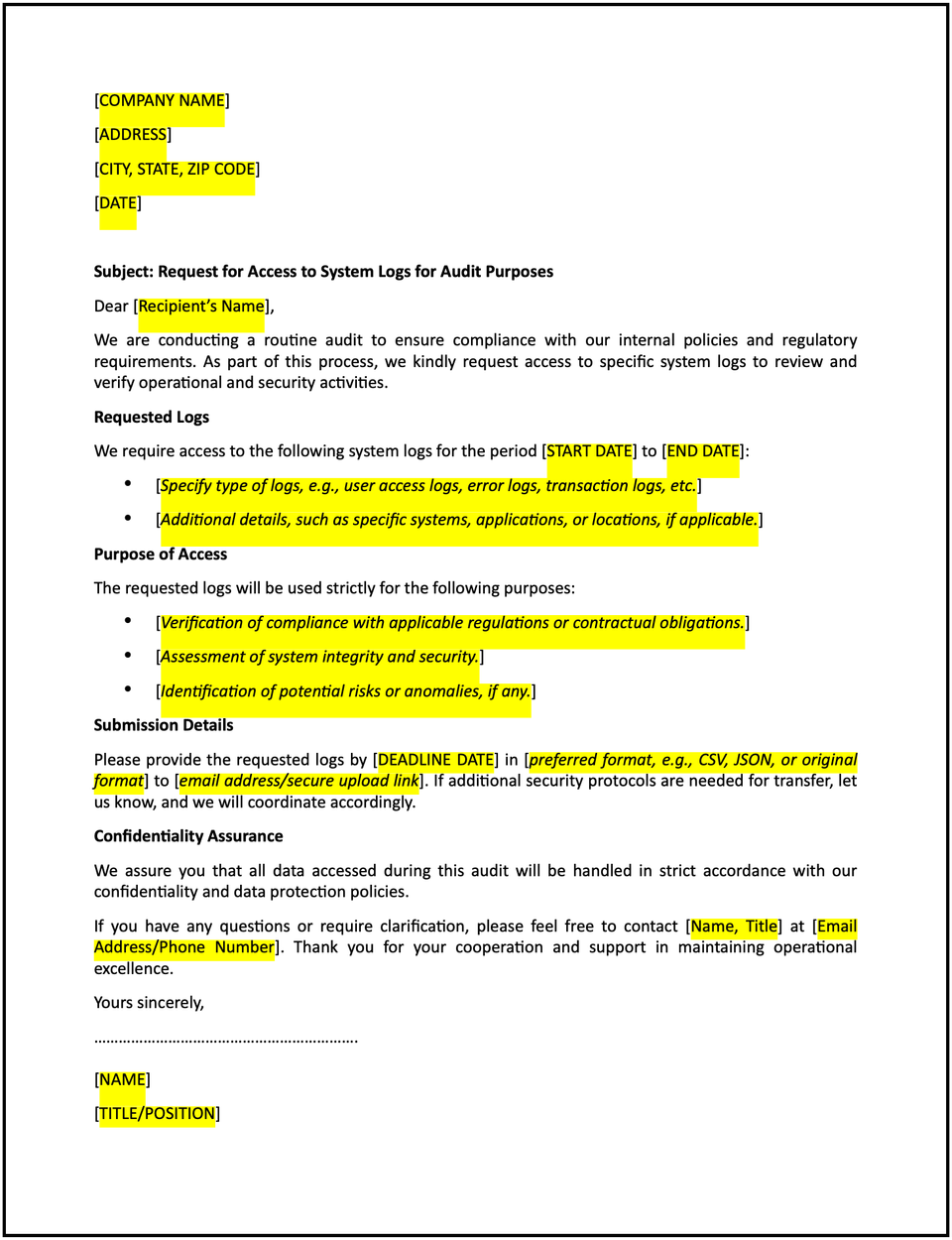Request letter for access to system logs for audit purposes: Free template

Request letter for access to system logs for audit purposes
A request letter for access to system logs for audit purposes is a formal communication used to seek authorization to review system logs for compliance, security, or operational audits. This letter outlines the purpose of the request, specifies the required access, and demonstrates professionalism to ensure collaboration and transparency.
How to use this request letter for access to system logs for audit purposes
- Open with an introduction: Address the recipient respectfully and state the purpose of the letter—to request access to system logs for audit purposes.
- Provide context: Briefly explain the reason for the audit, such as compliance requirements, security evaluations, or operational assessments.
- Specify the request: Clearly outline the scope of the logs needed, including timeframes, system types, or specific events.
- Highlight the importance: Emphasize how access to the logs will support the audit objectives and benefit the organization.
- Assure confidentiality: Reassure the recipient that access will be handled securely and responsibly to protect sensitive information.
- Include a timeline: Specify when the access is needed to facilitate timely completion of the audit.
- Invite collaboration: Encourage the recipient to share any concerns or discuss requirements further.
- Maintain a professional tone: Ensure the letter is clear, respectful, and focused on fostering cooperation.
- Provide contact information: Include details for the recipient to reach out with questions or to facilitate access.
Benefits of using a request letter for access to system logs for audit purposes
This letter ensures a structured and professional way to request access to system logs while fostering trust and transparency. Here’s how it helps:
- Promotes accountability: Clearly defining the request builds trust and ensures adherence to organizational policies.
- Reflects professionalism: A well-crafted letter demonstrates respect and attentiveness to data access protocols.
- Encourages collaboration: Inviting discussion fosters a cooperative approach to meeting audit objectives.
- Supports compliance: Providing a formal request aligns with regulatory and internal requirements.
- Enhances transparency: Open communication ensures clarity and reduces potential misunderstandings.
Tips for writing an effective request letter for access to system logs for audit purposes
- Be specific: Clearly describe the logs required, including relevant timeframes and event types.
- Use professional language: Maintain a respectful and solution-focused tone to encourage cooperation.
- Provide context: Briefly explain the purpose of the audit and why the logs are essential.
- Highlight confidentiality measures: Reassure the recipient that data will be handled securely and responsibly.
- Include a timeline: Specify when access is needed to ensure timely completion of the audit.
- Keep it concise: Focus on the key points while ensuring the tone is professional and collaborative.
Frequently asked questions (FAQs)
Q: What details should I include in this letter?
A: Include the purpose of the audit, the specific logs needed, the timeframe, and assurances about data confidentiality.
Q: Should I personalize the letter?
A: Yes, addressing the recipient directly ensures clarity and demonstrates attentiveness to their role.
Q: Who typically sends this letter?
A: Internal audit teams, compliance officers, or cybersecurity teams typically send this letter.
Q: How formal should this letter be?
A: The tone should be professional and focused on fostering trust and collaboration.
Q: When should this letter be sent?
A: Send the letter well in advance of the audit to allow sufficient time for approval and access setup.
Q: Can this letter include a summary of the audit objectives?
A: Yes, briefly summarizing the objectives can help the recipient understand the importance of the request.
Q: Is acknowledgment from the recipient required?
A: While not mandatory, requesting acknowledgment ensures the recipient is aware of and considering the request.
This article contains general legal information and does not contain legal advice. Cobrief is not a law firm or a substitute for an attorney or law firm. The law is complex and changes often. For legal advice, please ask a lawyer.


